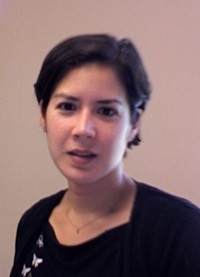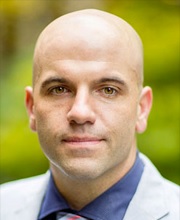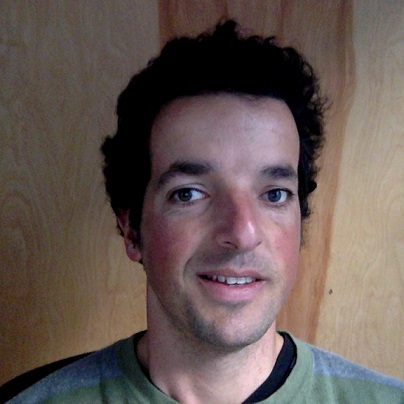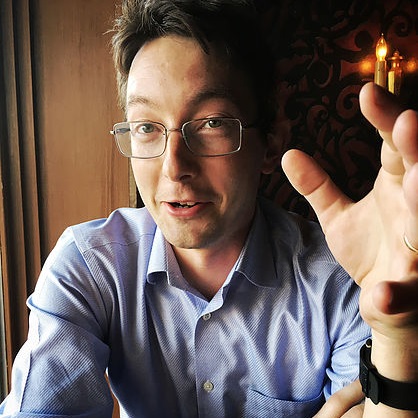Christine Luscombe received her first degree in Natural Sciences (Chemistry) at Trinity College at the University of Cambridge in the UK. She joined Professor Andrew Holmes’ and Dr. Wilhelm Huck’s groups in the Melville Laboratory for Polymer Synthesis at the University of Cambridge. In 2004, she became a postdoctoral fellow in the laboratory for Professor Jean M. J. Fréchet at the Department of Chemistry at UC Berkeley. She became an Assistant Professor at the Materials Science and Engineering Department at the University of Washington in 2006, and was promoted to Associate Professor in 2011. She has been the Robert J. Cambell Development Professor since 2017. Her research ranges from small molecule to polymer synthesis and is directed towards the design, synthesis, and applications of functional macromolecules. Current topics of research include semiconductor polymer synthesis for photovoltaic applications and for flexible electronics.
Jim Pfaendtner is the Connie and Steve Rogel Endowed Professor, and Department Chair of Chemical Engineering and Professor of Chemistry at the University of Washington. He holds a B.S. in Chemical Engineering (Georgia Tech, 2001) and a PhD in Chemical Engineering (Northwestern University, 2007). Additional appointments include Associate Vice Provost for Research Computing, Senior Scientist at the Pacific Northwest National Lab, and Senior Data Science Fellow at the UW eScience Institute. Jim’s research focus is computational molecular science and his recent teaching interests are in the area of teaching data science skills to grad students in chemical and materials science and engineering.
Dr. Elizabeth Nance is the Clare Boothe Luce Assistant Professor of Chemical Engineering at the University of Washington, with an appointment in Radiology and affiliation with the UW Center on Human Development and Disability. Elizabeth received her Ph.D. from Johns Hopkins University in Chemical & Biomolecular Engineering and completed a postdoc in Anesthesiology and Critical Care Medicine, with a research emphasis in neuroscience, at Johns Hopkins School of Medicine. Her research at UW develops methods to understand the developing brain’s response to injury or disease, and engineers nanotherapeutic platforms to treat brain disease.
Dr. Liu’s Molecular Biophotonics Lab focuses on the development of optical imaging strategies for clinical applications, primarily in oncology. For example, the lab develops miniature microscopes for surgical guidance and larger devices for nondestructive 3D pathology. Major efforts are underway in machine learning for the analysis of large microscopy datasets for clinical decision support (precision medicine). Dr. Liu also helps to teach the Engineering Innovation in Medicine (EIH) biodesign program at UW.
Kevin Jamieson is an Assistant Professor in the Paul G. Allen School of Computer Science & Engineering at the University of Washington, and is the Guestrin Endowed Professor in Artificial Intelligence and Machine Learning. Jamieson’s research explores how to leverage already-collected data to inform what future measurements to make next, in a closed loop. Such active learning can extract considerably richer insights than any measurement plan fixed in advance, using the same statistical budget. His work ranges from theory to practical algorithms with guarantees to open-source machine learning systems and has been adopted in a range of applications, including measuring human perception in psychology studies, adaptive A/B/n testing in dynamic web-environments, numerical optimization, and choosing hyperparameters for deep neural networks.
Ariel Rokem is a Research Assistant Professor at the University of Washington’s Department of Psychology. He received a PhD in neuroscience from UC Berkeley (2010) and additional postdoctoral training in computational neuroimaging at Stanford (2011 – 2015). He was also previously a Senior Data Scientist at the University of Washington eScience Institute (2015-2020). He leads a research program in neuroinformatics, the development of data science tools, techniques and methods and their application to the analysis of neural data.
Nathan Kutz is the Yasuko Endo and Robert Bolles Professor of Applied Mathematics at the University of Washington, having served as chair of the department from 2007-2015. He has a wide range of interests, including neuroscience to fluid dynamics where he integrates machine learning with dynamical systems and control.
David Beck is a Research Associate Professor in Chemical Engineering at the University of Washington (UW), a Senior Data Science Fellow and Director of Research and Education for the eScience Institute. Founded in 2008, UW’s eScience Institute serves to advance data-intensive discovery in all fields from the humanities to science, engineering and medicine. Dr. Beck’s research explores the intersection of molecules and data science, or molecular data science, and its applications to energy, environment and health. Beck is the associate director of the NSF Research Traineeship Data Intensive Research Enabling Clean Tech (DIRECT) and a founding member of the Engineering Data Science Institute (EDSI) at UW. He is an adjunct faculty in the Paul G. Allen School for Computer Science and the Department of Environmental and Occupational Health Sciences and coordinates the UW Data Science Seminar.
Steve Brunton is an Associate Professor of Mechanical Engineering at the University of Washington, where he is also Adjunct Associate Professor of Applied Mathematics and a Data Science Fellow at the eScience Institute. Steve received the B.S. in mathematics from Caltech in 2006 and the Ph.D. in mechanical and aerospace engineering from Princeton in 2012. His research combines machine learning with dynamical systems to model and control systems in fluid dynamics, biolocomotion, optics, energy systems, and manufacturing. He is a co-author of three textbooks, received the Army and Air Force Young Investigator Program awards, the Presidential Early Career Award for Scientists and Engineers (PECASE), and he was awarded the University of Washington College of Engineering junior faculty and teaching awards.
Magdalena Balazinska is Professor and Director of the Paul G. Allen School of Computer Science & Engineering at the University of Washington. Magdalena’s research interests are in the field of database management systems. Her current research focuses on data management for data science, big data systems, cloud computing, and image and video analytics. Prior to her leadership of the Allen School, Magdalena was the Director of the eScience Institute, the Associate Vice Provost for Data Science, and the Director of the Advanced Data Science PhD Option.









